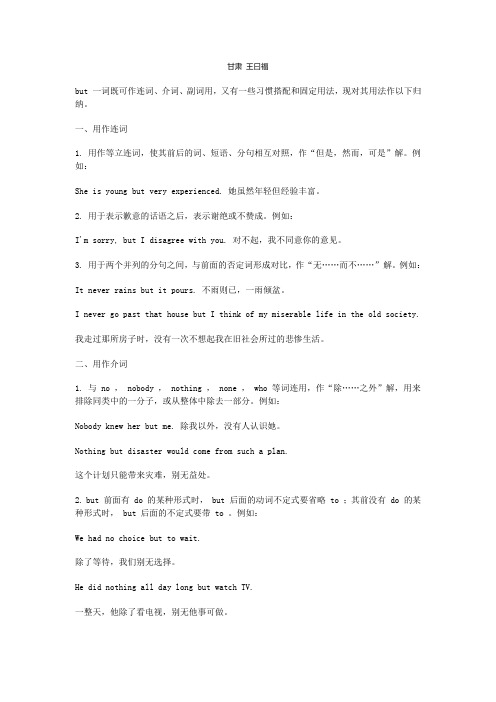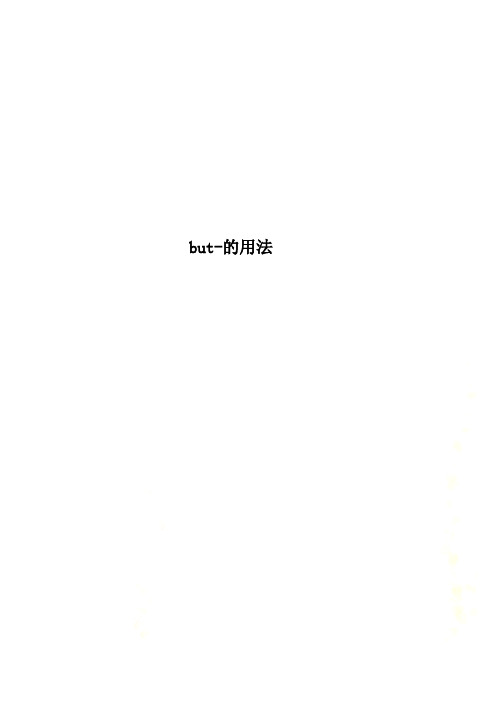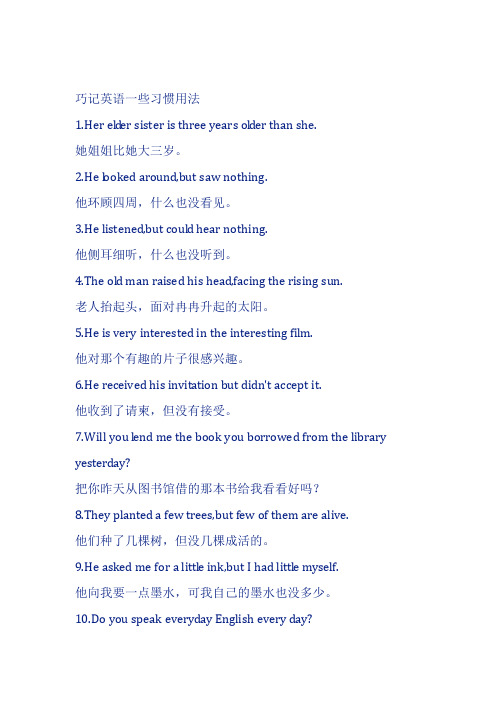But连词的习惯用法
BUT用法

甘肃王曰福but 一词既可作连词、介词、副词用,又有一些习惯搭配和固定用法,现对其用法作以下归纳。
一、用作连词1. 用作等立连词,使其前后的词、短语、分句相互对照,作“但是,然而,可是”解。
例如:She is young but very experienced. 她虽然年轻但经验丰富。
2. 用于表示歉意的话语之后,表示谢绝或不赞成。
例如:I'm sorry, but I disagree with you. 对不起,我不同意你的意见。
3. 用于两个并列的分句之间,与前面的否定词形成对比,作“无……而不……”解。
例如:It never rains but it pours. 不雨则已,一雨倾盆。
I never go past that house but I think of my miserable life in the old society.我走过那所房子时,没有一次不想起我在旧社会所过的悲惨生活。
二、用作介词1. 与 no , nobody , nothing , none , who 等词连用,作“除……之外”解,用来排除同类中的一分子,或从整体中除去一部分。
例如:Nobody knew her but me. 除我以外,没有人认识她。
Nothing but disaster would come from such a plan.这个计划只能带来灾难,别无益处。
2. but 前面有 do 的某种形式时, but 后面的动词不定式要省略 to ;其前没有 do 的某种形式时, but 后面的不定式要带 to 。
例如:We had no choice but to wait.除了等待,我们别无选择。
He did nothing all day long but watch TV.一整天,他除了看电视,别无他事可做。
3. 与 last , next 及 one , two 等连用,作“倒数第二、第三”等解。
but-的用法

but-的用法but 的用法之一but 一词既可作连词、介词、副词用,又有一些习惯搭配和固定用法,现对其用法作以下归纳。
一、用作连词1. 用作等立连词,使其前后的词、短语、分句相互对照,作“但是,然而,可是”解。
例如:She is young but very experienced.她虽然年轻但经验丰富。
2. 用于表示歉意的话语之后,表示谢绝或不赞成。
例如:I’m sorry, but I disagree with you. 对不起,我不同意你的意见。
3. 用于两个并列的分句之间,与前面的否定词形成对比,作“无……而不……”解。
例如:It never rains but it pours. 不雨则已,一雨倾盆。
I never go past that house but I think of my miserable life in the old soc iety.我走过那所房子时,没有一次不想起我在旧社会所过的悲惨生活。
二、用作介词1. 与 no , nobody , nothing ,none , who 等词连用,作“除……之外”解,用来排除同类中的一分子,或从整体中除去一部分。
例如:Nobody knew her but me. 除我以外,没有人认识她。
Nothing but disaster would come f rom such a plan.这个计划只能带来灾难,别无益处。
Tom is but a child. 汤姆只是个孩子。
We can but try now. 我们现在只有尝试一遍。
2. but 出现在too … to …结构前面时,不定式含肯定意义。
例如:I’m but too glad to go there wit h you.我非常高兴和你一起去那里。
四、含 but 的习惯用语1. but for = without ,意为“要不是;如果没有”,意思上相当于一个虚拟条件句。
英语连词and,or,but的用法的用法

英语连词and,or,but的用法的用法一、选择题1.Lucy, don’t turn off the computer before closing all programs, ________you could have problems.A.or B.and C.but D.so2.You’d better wake up Tom at 6:30, he will be late for the match.A.if B.or C.and D.but3.Speak louder, __________ everyone can understand you.A.so B.or C.for D.but4.2018年上海长宁二模Martin didn't eat up all the food he ordered,________he took the rest away.A.for B.or C.as D.so5.Hurry up, _______ we’ll be late for the first bus.A.and B.but C.so D.or6.The music was too loud, I turned it down.A.so B.because C.but D.or7.I had a fever, _ I went to see a doctor.A.for B.or C.but D.so8.I must go back home before 11 p.m., ________ my father will be angry with me.A.and B.or C.so D.but9.----Would you like to lend me some money?----I’d love to, _______ I left my purse at home.A.so B.and C.or D.but10.Follow the teachers' instructions, __________ you may get hurt when exercising.A.so B.or C.but D.and11.I was feeling hungry, ______ I bought myself a sandwich.A.but B.so C.or D.because 12.Mike, don't be afraid to make mistakes, _________ you'll never make progress.A.so B.or C.and D.but13.Those who want to lose weight have to exercise every day, _________ they might get fat again.A.though B.if C.so that D.or14.Don’t be crazy about computer games, ________ your parents will be worried.A.and B.or C.but D.so15.2018年上海崇明二模Please dial 120 immediately,_______ the old man may die soon. A.and B.or C.but D.so16.The traffic rules say divers mustn’t drive if they are drunk, _______ they will be punished. A.and B.but C.so D.or17.Do you want to go now, would you like to leave later?A.but B.or C.and D.so18.Hurry up, you will miss the busA.or B.And C.but D.so19.Set down your pens when you hear the bell rings, ____ you’ll be against the rules. A.and B.but C.so D.or20.—Hurry up, Tom, we’ll be late for the movie.—Ok, I will.A.but B.or C.and D.So21.The dress is really nice, _________it do esn’t look good on me .A.for B.so C.but D.or22.-- Do you like reading history books when you are free?-- No! I like story books _ _ I almost read them every day.A.and B.but C.or D.then23.We will never see Kobe play another basketball game, ________we will always remember him.A.because B.unless C.but D.if24.Bob is young, _______ he knows a lot.A.because B.so C.but D.unless25.We can enjoy the books in the reading room, we can't take them out.A.and B.but C.or D.so26.The thing that matters is not whether you fail or not, ________ whether you try or not. A.and B.or C.so D.but 27.—Would you like to go to the cartoon show with me?—It sounds like fun, ________ I’m too busy.A.so B.or C.for D.but28.Ben was busy taking a training class, ______we had to wait for him for half an hour. A.so B.if C.or D.but29.— Some people think students may waste time while studying at home.—It is true, ________ students have improved their ability through learning independently. A.but B.so C.or30.The s hirt looks good on me, ________ it’s a little expensive.A.but B.and C.or D.so31.I’ve wanted to read The Little Prince for long, _______ today I finally borrowed the book from the library.A.or B.since C.and D.because 32.The jacket is nice, _________ it d oesn’t look good on me.A.so B.if C.but D.or33.The team met a lot of difficulties, ______ they never gave up and won the game at last. A.or: B.and C.but D.so34.Would you like to go to the museum with me?I’d love to, ______ I’m afraid I have no time.A.but B.and C.or D.so35.I'd like to stay longer, I'm too busy.A.and B.but C.or D.until36.— Excuse me. Do you have a table for two?—I’m sorry, there aren’t any seats now. Would you mind waiting a while?A.so B.or C.and D.but37.Money is very important_________it’s not the most important thing in our life.A.or B.and C.but D.so38.– How do you like this soap opera?–I think it’s very boring, ________ my mother always wants to watch it.A.if B.but C.or D.So39.--Anna, what a nice dress you are wearing today!--Thank you. It fits me well, ______________ the colour is not my favourite.A.and B.so C.but D.or40.It was raining heavily, _____ we decided to stay at home and watch TV.A.but B.or C.because D.so【参考答案】一、选择题1.A【详解】句意:露西,在关闭所有程序之前不要关掉电脑,否则你会有问题的。
巧记英语一些习惯用语区分

巧记英语一些习惯用法1.Her elder sister is three years older than she.她姐姐比她大三岁。
2.He looked around,but saw nothing.他环顾四周,什么也没看见。
3.He listened,but could hear nothing.他侧耳细听,什么也没听到。
4.The old man raised his head,facing the rising sun.老人抬起头,面对冉冉升起的太阳。
5.He is very interested in the interesting film.他对那个有趣的片子很感兴趣。
6.He received his invitation but didn't accept it.他收到了请柬,但没有接受。
7.Will you lend me the book you borrowed from the library yesterday?把你昨天从图书馆借的那本书给我看看好吗?8.They planted a few trees,but few of them are alive.他们种了几棵树,但没几棵成活的。
9.He asked me for a little ink,but I had little myself.他向我要一点墨水,可我自己的墨水也没多少。
10.Do you speak everyday English every day?你天天讲日常英语吗?11.Sometimes I spend some time on novels.有时,我花点时间看小说。
12.Eleetricety was not discovered by Edison,but he invented the electric light.电不是爱迪生发现的,但他发明了电灯。
13.Nothing is permitted,everything is allowed.一切都有不(明文)准许,但也不(明文)禁止。
含蓄条件句

含蓄虚拟条件句的七种表现形式所谓含蓄虚拟条件句即指将条件从句隐藏在上下文一定的短语中的一类条件句,其主要用法及表现形式可归纳如下:1. 将条件隐含在不定式短语中I would write to her, but I don’t know her address. 我会给她写信的,就是不知道她的地址。
(=If I knew her address, I would write to her. But…)To have studied harder, you would have passed the examination. 你学习更用功些,你早就考及格了。
(=If you had studied harder, you…)2. 将条件隐含在分词短语中Born in better times, he would have been a scholar. 如果出生在好时代,他早就成为学者了。
(=If he had been born in better times, he would…)Failing this time, what would you do 假若这次失败,那你怎么办(=If you failed this time, what would…)Walking alone in the dark, Mary would be terrified. 要一个人单独在黑暗中行走,玛丽会感到十分害怕。
(If Mary walked alone in the dark, she…)3. 将条件隐含在介词短语中But for your help we couldn’t have succeeded in the experiment. 如果没有你的帮助,我们的实验是不会成功的。
(=If it hadn’t been for your help, we…)In different circumstances, I would have said yes. 在不同的情况下,我就会同意了。
初中英语,高频词but用法及考点全面解析.doc

初中英语,高频词but用法及考点全面解析这个词是大家在英语学习的过程中,使用频率特别高的一个,从我们接触英语开始,经常会用到它。
今天之所以把它拿出来单独讲,是因为除了使用它的频率高,更重要的是它的用法非常广泛,当然考查的内容也就多。
but这个词用法比较复杂,它可以做连词、副词、介词等。
而且它还可以构成许多固定搭配、连接并列句、引导多种从句等。
接下来我们就一起来看一下它的用法:第一,作介词的用法1、but作介词的时候,经常会与nobody, nothing, no, none, who 等这些词连用意思是“除了,除……之外,”表示从同类的一个整体当中除掉一部分。
大家可以看下面这两个例句来体会一下:2、大家在使用的时候要注意,它的前面如果有do的某种形式,比如像did或者是does,这个时候它的后面要省略to;如果没有的话,它的后面就要带上to。
大家不需要过多去强化记忆这个知识点,只要记住下面两个例句,就能轻松掌握。
第二,作连词的用法but作连词的时候,大家需要记住三个用法:其中一个是它所连接的两个词、短语或者连接从句前后是相互对立的,可以翻译成“但是,然而,可是” 的意思。
这个用法可以说是最简单也是最常用的,比如下面这两个句子:它的另一个用法是引导从句,与前面的否定词相对应,可以翻译成“无……而不……;……的话,必定……”的意思,大家可以记住下面两个句子:它的最后一个用法是用在表示歉意的话之后,可以表示有礼貌的拒绝,也可以表示不赞同。
是一种很委婉的表达。
比如下面两个例句:第三,作副词的用法作副词主要有两个用法,一个是相当于only, just, 意思是“只能、仅仅、不过”,后面经常跟动词或者是名词;它的另一个用法是用在can 的后面,意思是“只能”;用在cannot的后面,意思是“不得不”,我们看下面的例句讲解:第四,习惯用法but的习惯用语有很多,我们来看最常用的这几个:1、but…that相当于if…not虚拟条件从句,意思是,“要不是,若非……”;2、but for,它的意思相当于without,后面经常接名词、动名词、代词,多用于虚拟语气,意思是,“要不是……早就……,如果没有……,若非……就”;3、nothing but意思是“只不过”;not… but… 意思是“不是……而是……”,连接两个并列成分;anything but意思是,“决不,一点儿不”,经常用它来加强语气,用在动词之后;如下面的例句:4、not only…but also…意思是“不但……而且……,既……又……,”同样连接两个并列成分,我们一起看一下例句:。
notonlybutalso[史上最全的not,only...but,also的用法]
notonlybutalso[史上最全的not,only...but,also的用法]史上最全的not only...but also的用法史上最全的not only...but also的用法not only...but also 是英语中常见的一对连词, 相当中文的“不仅…… 而且”。
Not only…but also 是英语中较为常见的一个关联词组。
由于它的用法比较复杂,本文拟对其用法及其使用中应注意的问题作一归纳。
一、not only…but的主要用法1.连接主语:Not only I but also Tom and Mary are fond of watching television. 不仅我,而且汤姆和玛丽都喜欢看电视。
2.连接宾语:The problem for the recipient was trying to guess not only who the sender was, but also what his secret feelings might be.收信人不仅要尽力猜出是谁的,还要推测寄信人内心有什么想法。
3.连接谓语动词The Americans and the British not only speak the same language but also share a large number of social customs.英国人和美国人不但语言相同,而且有很多相同的风俗习惯。
注意not only…but also连接的动词一般不重复,这与汉语不同。
如汉语说“我不仅懂英语,而且懂俄语”,英语则说“I know not only English but also Russian”,而不说“I not only know English but also know Russian”.再如:“气体不仅改变形状,而且改变体积”,英译为“A gas changes not only in shape but also in volume.”(注意介词常重复) 4.连接表语:Shakespeare was not only a writer but (also) an actor 莎士比亚不仅是一位剧作家,而且是一位演员。
史上最全的摄影师史上最全的notonly...butalso的用法
史上最全的摄影师史上最全的notonly...butalso的用法not only.but also 是英语中常见的一对连词, 相当中文的“不仅。
而且”。
Not only。
but also是英语中较为常见的一个关联词组。
由于它的用法比较复杂,本文拟对其用法及其使用中应注意的问题作一归纳。
一、not only。
but的主要用法1.连接主语:Not only I but also Tom and Mary are fond of watching television.不仅我,而且汤姆和玛丽都喜欢看电视。
2.连接宾语:The problem for the recipient was trying to guess not only who the sender was, but also what his secret feelings might be.收信人不仅要尽力猜出是谁的,还要推测寄信人内心有什么想法。
3.连接谓语动词The Americans and the British not only speak the same language but also share a large number of social customs.英国人和美国人不但语言相同,而且有很多相同的风俗习惯。
注意not only。
but also连接的动词一般不重复,这与汉语不同。
如汉语说“我不仅懂英语,而且懂俄语”,英语则说“I know not only English but a lso Russian”,而不说“I not only know English but also know Russian”.再如:“气体不仅改变形状,而且改变体积”,英译为“A gas changes not only in shape but also in volume.”(注意介词常重复)4.连接表语:Shakespeare was not only a writer but (also) an actor 莎士比亚不仅是一位剧作家,而且是一位演员。
notonlybutalso用法总结
notonlybutalso用法总结“Not onlybut also”用法总结“Not onlybut also”是英语中一个非常常用且重要的句型,它能够帮助我们更准确、丰富地表达思想。
接下来,让我们一起深入探讨它的用法。
一、基本结构“Not onlybut also”的基本结构为“not only +部分 A + but also +部分B”。
其中,部分 A 和部分 B 在语法上通常保持一致,可以是单词、短语或者句子。
例如:“Not only he but also she likes music”(不仅他,而且她也喜欢音乐。
)“Not only reading but also writing is important for language learning”(不仅阅读,而且写作对语言学习都很重要。
)二、连接词的位置1、当连接两个主语时谓语动词的数要与“but also”后面的主语保持一致。
例如:“Not only the students but also the teacher was late for the meeting”(不仅学生们,而且老师开会也迟到了。
)2、当连接两个宾语时通常将较长或较复杂的宾语放在“but also”之后,以保持句子平衡。
例如:“He gave me not only some books but also some advice”(他不仅给了我一些书,而且还给了我一些建议。
)3、当连接两个状语时位置比较灵活,但习惯上倾向于将较长或较强调的状语放在“but also”之后。
例如:“She not only sings well but also dances beautifully”(她不仅歌唱得好,而且舞也跳得美。
)三、倒装用法1、当“not only”位于句首时,其后的句子要用部分倒装语序,即将助动词、be 动词或情态动词提到主语之前。
例如:“Not only did he come, but also he brought us a present”(他不仅来了,而且还给我们带了礼物。
初中英语(完整版)连词and,or,but的用法练习题及答案
初中英语(完整版)连词and,or,but的用法练习题及答案一、选择题1.The last bus had left when we arrived,_____ we had to find a hotel to stay for the night.A.so B.but C.or D.because2.Set down your pens when you hear the bell rings, ____ you’ll be against the rules.A.and B.but C.so D.or3.Tony had a high fever and coughed a lot, ________ his parents took him to hospital at once. A.for B.but C.or D.so4.I didn’t have breakfast this morning, ________ I am very hungry now.A.but B.so C.or D.and5.Speak louder, __________ everyone can understand you.A.so B.or C.for D.but6.________ he used to be 200 kilos in the past, he has lost too much weight by exercising now. A.Although B.So C.Until D.But7.2018年上海长宁二模Martin didn't eat up all the food he ordered,________he took the rest away.A.for B.or C.as D.so8.Hurry up, _______ we’ll be late for the first bus.A.and B.but C.so D.or9.He ran quickly all the way to school, ______ he was still late.A.but B.and C.or D.so10.I had a fever, _ I went to see a doctor.A.for B.or C.but D.so11.----Would you like to lend me some money?----I’d love to, _______ I left my purse at home.A.so B.and C.or D.but12.It was very dark outside, ___________ we had to feel our way slowly.A.so B.but C.for D.or13.It’s hot today, ______we w ant to go swimming in the river.A.though B.but C.so D.or14.—The brown jacket is nice, ________ it doesn’t look good on me.—Why not try on the blue one? I think blue suits you fine.A.and B.so C.but D.or15.Follow the teachers' instructions, __________ you may get hurt when exercising.A.so B.or C.but D.and 16.Lucy, don’t turn off the computer before closing all programs, ________you could have problems.A.or B.and C.but D.so17.Mike, don't be afraid to make mistakes, _________ you'll never make progress.A.so B.or C.and D.but18.Don’t be crazy about computer games, ________ your parents will be worried.A.and B.or C.but D.so19.2018年上海崇明二模Please dial 120 immediately,_______ the old man may die soon. A.and B.or C.but D.so20.The music was too loud, I turned it down.A.so B.because C.but D.or 21.Romantic comedies have not received a lot of love at the box office lately, ____ that could change last weekend with "Crazy Rich Asians".A.if B.when C.unless D.but22.The toys are really old, ________ I still want to keep them.A.or B.and C.but23.I really want to have a pet dog,_____ my mother disagrees.A.but B.and C.or D.so 24.—Would you like to go to the cartoon show with me?—It sounds like fun, ________ I’m too busy.A.so B.or C.for D.but25.Going to the movies is good, ______ I really only like listening to music.A.and B.but C.so D.or26.Ben was busy taking a training class, ______we had to wait for him for half an hour. A.so B.if C.or D.but27.Diana isn’t here, ______ leave a message on her des k.A.or B.so C.and D.but28.A snake bit him ___________ he went to see a doctor at once.A.if B.where C.because D.so29.— Some people think students may waste time while studying at home.—It is true, ________ students have improved their ability through learning independently. A.but B.so C.or30.I like your story, _______ I’m confused by the ending. Can you explain it?A.and B.or C.so D.but31.You should return the digital camera to Sally ________she will get angry.A.so that B.because C.before D.or32.—Can you help me with my housework?— I'd like to, ________I have to look after my baby sister.A.because B.as C.but D.if33.The F1 driver is hugely talented, ________ he still works hard to achieve his goals. A.so B.but C.if D.though34.I’d love to go to the theatre tonight, _________ I am too busy.A.so B.or C.but D.and35.I was late for school today ______ I didn’t catch the early bus.A.because B.so C.but D.then36.—I don’t like reading ______ watching TV. What about you?—I don’t like reading al l day , ______ I like watching TV news.A.and ; or B.and ; and C.or ; and D.or ; but37.I'd like to stay longer, I'm too busy.A.and B.but C.or D.until38.– How do you like this soap opera?–I think it’s very boring, ________ my mother alw ays wants to watch it.A.if B.but C.or D.So39.I was feeling hungry, ______ I bought myself a sandwich.A.but B.so C.or D.because40.The shirt looks good on me, ________ it’s a little expensive.A.but B.and C.or D.so【参考答案】一、选择题1.A【详解】句意:当我们到达的时候,最后一班车已经离开了。
- 1、下载文档前请自行甄别文档内容的完整性,平台不提供额外的编辑、内容补充、找答案等附加服务。
- 2、"仅部分预览"的文档,不可在线预览部分如存在完整性等问题,可反馈申请退款(可完整预览的文档不适用该条件!)。
- 3、如文档侵犯您的权益,请联系客服反馈,我们会尽快为您处理(人工客服工作时间:9:00-18:30)。
But连词的习惯用法摘要:But 作为连词在大多数情况下都用作并列连词,但有时在一些固定结构中也可用作从属连词。
一、用作并列连词作为并列连词,but 可以连接两个并列的分句或者两个并列的成份,译为“但是”,“可是”。
能表示下列意义:1、表示意义转折。
例如:They are tired but happy.I was going to write, but I lost your address.Not one but two!2、表示对比或对照,通常与否定词连用。
例如:He is not good at maths, but he is good at English.He scarcely knows French, but he speaks English perfectly.3、出现在句首或句与句之间,表示异议,惊奇或吃惊。
如:A:I have won the long jump.B:But that's wonderful!4、用在表示歉意的词语之后,引起一个句子,长不能译为“但是”,可以不译出。
如:I'm sorry, but I can't come.Excuse me, but can you tell me the way to the library?固定短语:1)not only … but (also) … 这是一组关联并列连词,表示其所连接的成份在意义上后一项对前一项的补充和引申,但侧重点在后一项上,意思是“不但……而且……”。
但使用这一组关联并列连词必须注意两点:(1)当not only … but also 连接两个并列成份作主语时,其谓语动词的形式按照就近原则来确定。
(2)当not only … but a lso 连接两个并列成份时采用部分倒装形式,即倒装 not only 分句,而 but also 分句则采用陈述句语序。
如:Not only the mother but also the children are sick.Not only is he interested in the subject but also all his students are beginning to show interested in it.有时,but 和 also 可以被分隔使用。
如:She was not only compelled to stay at home but she also forbidden to see her friends.有时,but also 能被but … as well 所取代。
如:He can not only speak English but French as well.2)but then, 意思是“不过,另一方”,相当于nevertheless, on the other hand”。
如:She speaks English fluently, but then she did live in London for four years.3、not that … but that … 引导两个并的原因状语从句,that 相当于 because, 意思是“不是因为…… 而是因为……”。
如:I haven't worked out the maths problem, not that I have no time for it, but that I can't work it out. 有时not that … but that …结构可单独出现。
如:Not that I won't go, but that I don't know which is the way to go.二、用作从属连词But 在一些固定结构中作从属连词,引导状语从句和名词从句。
1、引导条件状语从句。
But that 可以用来引导条件状语从句,意思是“倘若,要不是”。
《牛津现代高级英汉双解词典》和一些语法书上将此结构中的 but 看成介词,that 则引导了特殊的介词宾语从句,但是《牛津现代高级英汉双解词典》和章振帮先生所著《新编英语语法》等认为 but that 为复杂从属连词, but that 从句为条件状语从句,本人倾向于后一种看法。
That 从句一般不作介词补足成分,将 but that 理解为复杂从属连词,有助于确切理解从句 but that 的真正意义, but that 从句用陈述语气,而主句则常用虚拟语气,but that 从句可以同否定的 if 从句互换。
例如:But that you lent him a large sum of money, he would have gone bankrupt.此句可改为:If you hadn't lent him a large sum of money, he would have gone bankrupt.有时 but that 从句出现于含有 not 的主句之后,意思是:“只有…… 才……”。
例如:He will not find the answer but that he studies it thoroughly.He will not come but that he is asked.2、引导比较状语从句。
用no sooner … but … 结构引导比较状语从句,but 相当于 than 如:It no sooner started raining but it stopped.3、用 not but that (what) 结构引导让步状语从句,意思是“虽然,诚然”。
如:He is very strong —not but that he will catch cold sometimes. 意思为“他身体很强壮,虽然有时会患感冒”。
I've never walked that far, not but what I could do it if I tried. 意思为:我从来没走那么远,虽然我要走还是可以走。
4、引导结果状语从句。
(1)not so … but (that/what)… 或not such a … but,意思为“不是如此……以致于不”。
其中 but 的意思是接近于“that … not …”。
例如:He is not such a fool but that he can see through Mary.(2)否定句+but(that)+从句,意思为“每当……总是……”,其中 but 相当于“that…not …”,通过双重否定来表达肯定的因果关系。
例如:I never go past my old school but I think of the happy years I spent there.意思为:“每当我走过我的母校时,我都想起我在那儿度过的快乐岁月。
”5、引导名词性从句,常用于下列结构中:I didn't doubt/question but that…There is no doubt/question but(that)…这些结构中的 but 或 but that 并无实在意义,相当于连词 that 。
例如:there is no doubt but he is the quilty one,意思为:“毫无疑问,犯罪的就是他”。
在实际应用中,but 用作连词和介词容易混淆。
如果 but 被看作连词,其后的人称代词可以被看成是一个省略的谓语部分的主语。
应该是主格形式。
例如:Everyone lost fainth in the plan but she.No one found the answer but she.更为常见的是 but 用作介词,这样其后的人称代词“she”可改为格“her”。
但是,一般说来,but 和其后的人称代词如果置于谓语动词之前,人称代词用主格形式。
如:Everyone but she lost faith in the plan.No one but she found the answer.至此,本文较为详细地归纳了 but 作为连词时的用法,深入地探讨了 but 作为并列连词和从属连词及其固定短语的意义和用法,并配以实例说明。
这样对于我们理解含有 but 的句子尤其是含有 but 的双重否定句将有一定作用。
参考文献:(1)章振帮《新编英语语法教程》上海外语教育出版社(2)第六版《牛津高阶英汉双解词典》牛津大学出版社语法考题考查but的四个热点一、直接考查连词but在语境中的用法即要求考生根据试题的语境(看其是否有转折意味)来确定连词but的正确使用。
这类考题通常会将连词but与连词and, so, or等结合起来考查。
同学们做题时要注意比较,尤其要注意比较各个连词填入句子后,比较句意的逻辑性和通畅性。
如:1.You have failed two tests. You’d better start working harder, _________ you won’t pass the course.A. andB. soC. butD. or【解析】D。
or的意思是“否则”“要不然”,只有此词填入空格,句意最通顺。
2. They wanted to charge $5, 000 for the car, _________ we managed to bring the price down.A. butB. soC. whenD. since【解析】A。
前后两分句之间是转折关系,故用but。
3.—Somebody wants you on the telephone.—_________ no one knows I’m here.A. ForB. AndC. ButD. So【解析】C。
“有人打电话来找我”与“没有人知道我在这里”是转折关系,故填but。
二、利用but的转折语境考查其他知识点即根据题干中连词but的转折性语境来确定相关知识点的选择。
此时尤其要注意前后相关信息的对比、对照或互为相反义。
如:1. He has made a lot of films, but _________ good ones.A. anyB. someC. fewD. many【解析】C。
由于句中用了转折连词but,所以要填few与前面的many相对比。
2.It’s hard for him playing against me. I’ve got nothing to play for, but for him, he needs to win so _________.A. farB. wellC. littleD. badly【解析】D。
